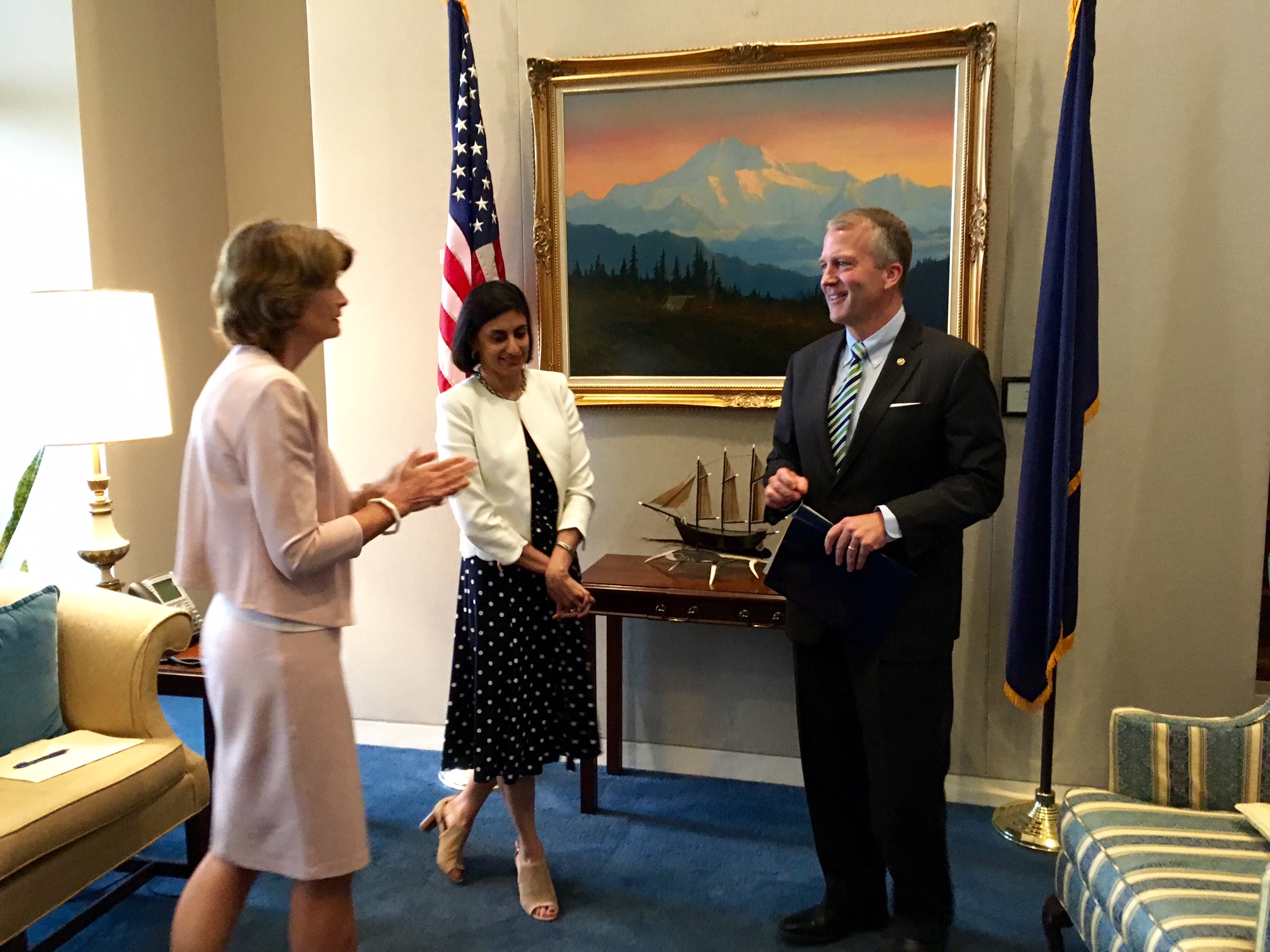
While Sen. Lisa Murkowski was in the national spotlight for defying her party on health care, Alaska’s other senator, Dan Sullivan, stuck to the party line and attracted little attention.
This was hardly the first time they’ve split their votes.
The two senators vote opposite each other more than most Republican pairs from the same state.
Murkowski is getting all kinds of disapproval on social media from people who say she betrayed the party when she voted with Democrats to preserve the Affordable Care Act.
She’s making no apologies, and said she fended off a hard-sell at the White House.
“I made a statement to the president, with my colleagues and with his team there, that I’m not voting for the Republican party,” Murkowski said in a CNN interview. “I’m voting for the people of Alaska.”
Murkowski and Sullivan both say they vote for what’s right for Alaska, but their votes differ about 6 percent of the time. If that doesn’t sound like a lot, keep in mind that a good deal of Senate votes are nearly unanimous. And most of the rest follow party lines.
If you rank all 52 Republican senators according how often they’ve voted against the majority of their party this year, Murkowski is No. 4, according to ProPublica’s data. She has zigged while the rest of the Republicans zagged 11 times, often on hot-button issues.
Murkowski voted against President Trump’s Education secretary, Betsy DeVos. She’s voted to continue Medicaid payments to Planned Parenthood. And she voted to allow Americans to buy cheaper prescription drugs from Canada.
Sullivan, and most other Republicans, voted the opposite way. He’s voted with the majority of his party nearly 99 percent of the time. Twice he voted against – once to object to NASA’s use of Russian-made rockets, another time to support a non-binding statement on the importance of Medicaid expansion.
Of the 20 states that have two Republican senators, Alaska is near the top of the list for vote disagreement. Only Arizona and Kentucky’s Republican senators disagree with each other more.
Congressional scholar Norm Ornstein at the American Enterprise Institute said the differences between the two Alaska senators were on full display during the health care proceedings last month.
“For a lot of us who watch the Senate, it was a puzzle that while she was very direct in standing up for a large group of Alaskans deeply affected by the Medicaid cuts, he said nothing and voted with (Senate Majority Leader) Mitch McConnell,” Ornstein said.
As Ornstein sees it, it goes back to Murkowski’s re-election of 2010, when she lost the Republican Primary and won the General on a write-in, with no party help. She was re-elected in the conventional way last year, but Ornstein says 2010 proves she’s popular enough in Alaska that she doesn’t have to worry about conservative groups like Club for Growth or Heritage Action making too much headway against her.
“She feels a greater level of independence, I think, from some of those tribal pressures of the party,” Ornstein said. “And Sullivan appears to be much more willing to succumb to those tribal pressures.”
Sullivan scoffs at the suggestion that he votes as he does out of party loyalty.
“No,” Sullivan laughed. “I vote my mind and my conscience.”
Sullivan said the Republicans have a good team in the Senate, so he’s not surprised his votes are in line with the majority. But he said he does his own research, meeting with every cabinet secretary he voted for, as well as the assistant secretaries and the deputies, and was proud to vote to repeal 14 regulations of the Obama years. During the health care negotiations, Sullivan said he was working hard behind the scenes to make the bill better, with more money for Alaska and a national fund for addiction and mental health treatment.
“I spent seven months and 90 percent of my time on health care,” Sullivan said.
Sullivan pointed out he and Murkowski have both voted with their party more than 9 out of 10 times, so he said they’re not that far apart.
Anchorage Conservative talk show host Dave Stieren, said Alaska’s Republican party spans a lot of ideological ground and the senators represent different camps within it.
“Sullivan (is) tending to be a bit more dogmatic in regards to conservative principles,” Stieren said. “Sen. Murkowski is, you know, as some of her critics have described her, she’s not conservative.”
Stieren said callers to his show on KFQD were pretty mad after Murkowski voted against Republican health care efforts, but he doesn’t think it’ll hurt her.
“People are angry. You know: ‘Oh I’m so upset with her I can’t believe she did this,’” Stieren recounted. “I’m going to go out on a limb and say that they were never fans of hers and may have never voted for her to begin with.”
The Senate is now on its August recess. Next month, the Senate Health Committee plans to hold bipartisan hearings on how to fix particular problems of the Affordable Care Act. Murkowski is a member of that committee, and that’s what she’s wanted all year.
